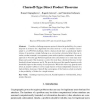Free Online Productivity Tools
i2Speak
i2Symbol
i2OCR
iTex2Img
iWeb2Print
iWeb2Shot
i2Type
iPdf2Split
iPdf2Merge
i2Bopomofo
i2Arabic
i2Style
i2Image
i2PDF
iLatex2Rtf
Sci2ools
125
click to vote
CRYPTO
2007
Springer
2007
Springer
Chernoff-Type Direct Product Theorems
Consider a challenge-response protocol where the probability of a correct response is at least α for a legitimate user and at most β < α for an attacker. One example is a CAPTCHA challenge, where a human should have a significantly higher chance of answering a single challenge (e.g., uncovering a distorted letter) than an attacker; another example is an argument system without perfect completeness. A natural approach to boost the gap between legitimate users and attackers is to issue many challenges and accept if the response is correct for more than a threshold fraction, for the threshold chosen between α and β. We give the first proof that parallel repetition with thresholds improves the security of such protocols. We do this with a very general result about an attacker’s ability to solve a large fraction of many independent instances of a hard problem, showing a Chernoff-like convergence of the fraction solved incorrectly to the probability of failure for a single instan...
Related Content
| Added | 07 Jun 2010 |
| Updated | 07 Jun 2010 |
| Type | Conference |
| Year | 2007 |
| Where | CRYPTO |
| Authors | Russell Impagliazzo, Ragesh Jaiswal, Valentine Kabanets |
Comments (0)

